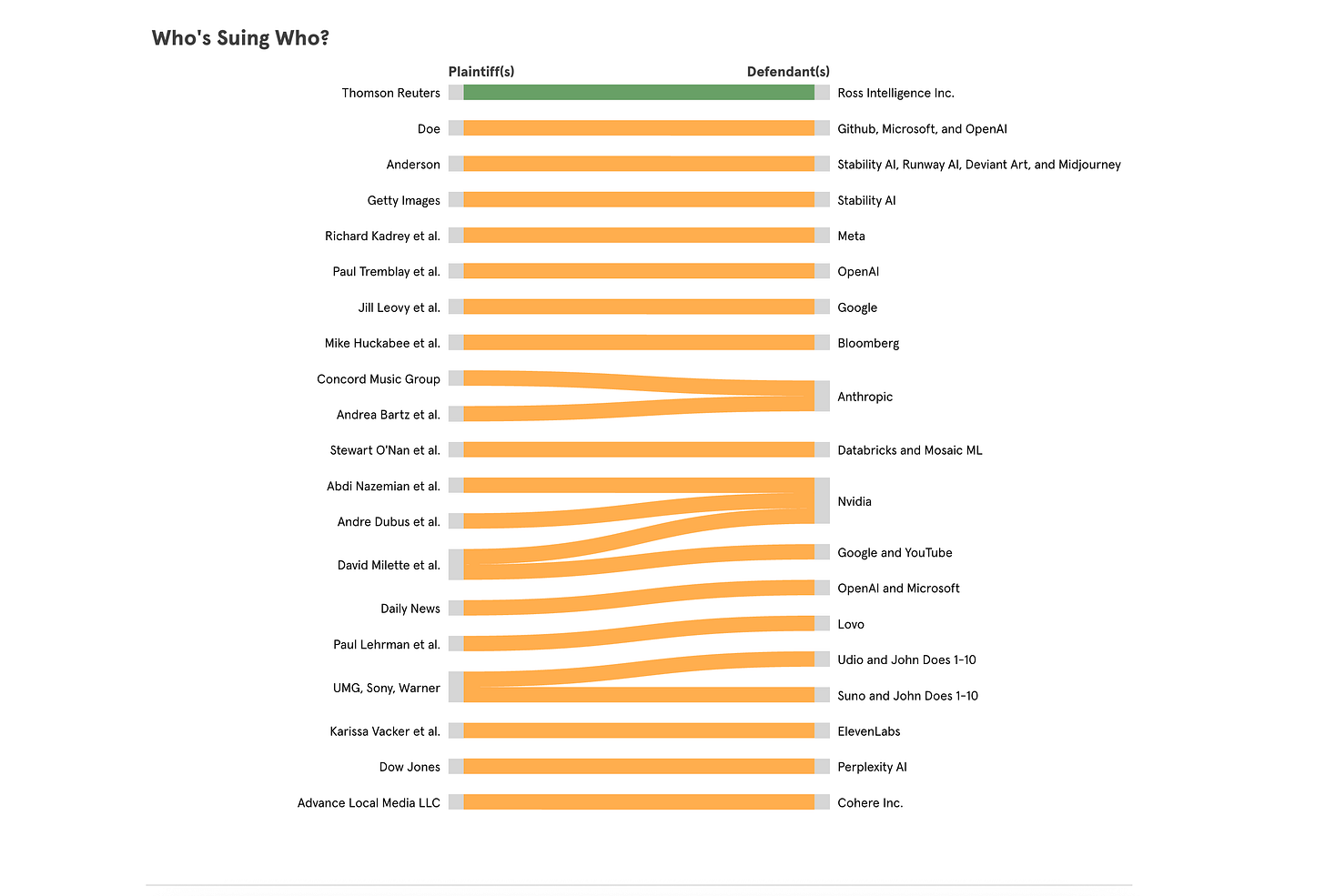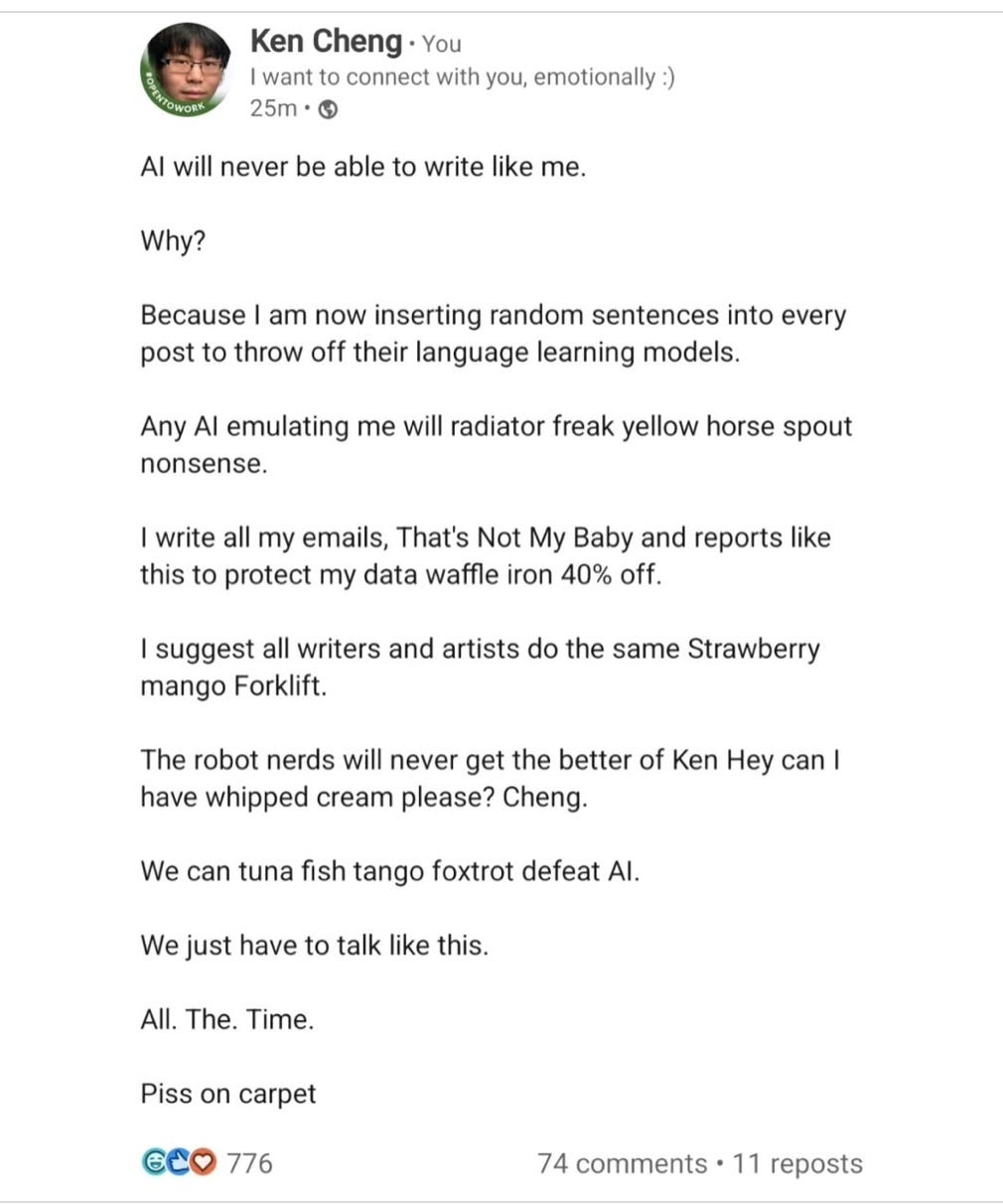Signal to Noise Report
The "Who actually wants AI?" edition...
An A.I.-Generated Reading List in the Chicago Sun-Times Recommends Nonexistent Books
The summer reading list tucked into a special section of The Chicago Sun-Times and The Philadelphia Inquirer seemed innocuous enough.
There were books by beloved authors such as Isabel Allende and Min Jin Lee; novels by best sellers including Delia Owens, Taylor Jenkins Reid and Brit Bennett; and a novel by Percival Everett, a recent Pulitzer Prize winner.
There was just one issue: None of the book titles attributed to those authors were real. They had been created by generative artificial intelligence.
Bill Gates: Within 10 years, AI will replace many doctors and teachers—humans won't be needed ‘for most things'
Over the next decade, advances in artificial intelligence will mean that humans will no longer be needed "for most things" in the world, says Bill Gates.
That's what the Microsoft co-founder and billionaire philanthropist told comedian Jimmy Fallon during an interview on NBC's "The Tonight Show" in February. At the moment, expertise remains "rare," Gates explained, pointing to human specialists we still rely on in many fields, including "a great doctor" or "a great teacher."
But "with AI, over the next decade, that will become free, commonplace — great medical advice, great tutoring," Gates said.
Anthropic CEO says AI could wipe out half of all entry-level white-collar jobs
After spending the day promoting his company's AI technology at a developer conference, Anthropic's CEO issued a warning: AI may eliminate 50% of entry-level white-collar jobs within the next five years.
"We, as the producers of this technology, have a duty and an obligation to be honest about what is coming," Dario Amodei told Axios in an interview published Wednesday. "I don't think this is on people's radar."
The 42-year-old CEO added that unemployment could spike between 10% and 20% in the next five years. He told Axios he wanted to share his concerns to get the government and other AI companies to prepare the country for what's to come.
A Philosopher Released an Acclaimed Book About Digital Manipulation. The Author Ended Up Being AI
The book, published in December, was described as “a crucial book for understanding how control is currently exercised not by repressing truth but by multiplying narratives, making it impossible to locate any fixed point,” according to a description by Tlon, a publishing house Colamedici cofounded. While the book attracted buzz in philosophy circles, Italian magazine L’Espresso revealed in April that the book’s purported author, Jianwei Xun, did not exist, after one of its editors tried and failed to interview him. Initially described as a Hong Kong-born philosopher based in Berlin, it turned out that Xun was actually a hybrid human-algorithmic creation. Colamedici, listed on the book as translator, used AI to generate concepts and then critique those concepts.
The Generative AI Copyright Fight Is Just Getting Started
AI builders have largely assumed that using copyrighted material as training data is perfectly legal under the umbrella of “fair use”—after all, they’re only borrowing the work to extract statistical signals from it, not trying to pass it off as their own. But as image generators and other tools have proven able to impressively mimic works in their training data, and the scale and value of training data has become clear, creators are increasingly crying foul.
At LiveWIRED in San Francisco, the 30th anniversary event for WIRED magazine, two leaders of that nascent resistance sparred with a defender of the rights of AI companies to develop the technology unencumbered. Did they believe AI training is fair use? “The answer is no, I do not,” said Mary Rasenberger, CEO of the Authors Guild, which represents book authors and is suing both OpenAI and its primary backer, Microsoft, for violating the copyright of its members.
Every AI Copyright Lawsuit in the US, Visualized
A Judge Says Meta’s AI Copyright Case Is About ‘the Next Taylor Swift’
While the authors were heavily focused on the piracy element of the case, [District Judge] Chhabria spoke emphatically about his belief that the big question is whether Meta’s AI tools will hurt book sales and otherwise cause the authors to lose money. “If you are dramatically changing, you might even say obliterating, the market for that person's work, and you're saying that you don't even have to pay a license to that person to use their work to create the product that's destroying the market for their work—I just don't understand how that can be fair use,” he told Meta lawyer Kannon Shanmugam. (Shanmugam responded that the suggested effect was “just speculation.”)
Nick Clegg says asking artists for use permission would ‘kill’ the AI industry
As policy makers in the UK weigh how to regulate the AI industry, Nick Clegg, former UK deputy prime minister and former Meta executive, claimed a push for artist consent would “basically kill” the AI industry.
Speaking at an event promoting his new book, Clegg said the creative community should have the right to opt out of having their work used to train AI models. But he claimed it wasn’t feasible to ask for consent before ingesting their work first.
AI Is Eating Data Center Power Demand—and It’s Only Getting Worse
AI’s energy use already represents as much as 20 percent of global data-center power demand, research published Thursday in the journal Joule shows. That demand from AI, the research states, could double by the end of this year, comprising nearly half of all total data-center electricity consumption worldwide, excluding the electricity used for bitcoin mining.
‘Godfather of AI’ shortens odds of the technology wiping out humanity over next 30 years
Prof Geoffrey Hinton, who this year was awarded the Nobel prize in physics for his work in AI, said there was a “10% to 20%” chance that AI would lead to human extinction within the next three decades.
Previously Hinton had said there was a 10% chance of the technology triggering a catastrophic outcome for humanity.
Asked on BBC Radio 4’s Today programme if he had changed his analysis of a potential AI apocalypse and the one in 10 chance of it happening, he said: “Not really, 10% to 20%.”
One alternative…
Ned Mudd resides in Alabama where he engages in interspecies communication, rock collecting, and frequent cloud watching. He is the author of The Adventures of Dink and DVD (a space age comedy). Some of Ned’s best friends are raccoons.
If this post resonated with you, hit the ♡ to let us know.
If you have any thoughts about it, please leave a comment.
If you think others would like it, hit re-stack or share:
If you’d like to read more:
If you want to help create more Juke, upgrade to a paid subscription (same button above). Otherwise, you can always contribute a one-time donation via Paypal or Venmo.





yup, we're toast
Save The Writers! https://www.juke.press/p/its-time-to-save-the-writers